Early in the afternoon of June 26, Pooya Mohseni came to a decision. It wasn't one she took lightly, even though it seemed almost casual to find herself typing the words out on Facebook. She had thought deeply about her choice for years -- weighing work, family, friends. It was a bold one, a life-changing one; one that as a child in Iran, then a wide-eyed teen in the States, she'd never imagined herself making.
But that fateful day was unlike any other: The U.S. Supreme Court had just ruled for freedom, announcing that same-sex marriages must be equally recognized under the law. So today would be the day. She would finally tell everyone that she is a transgender woman.
Calmly, the New York-based actress moved her computer's cursor over and clicked the glowing blue "post" box on her Facebook profile. She felt somehow nervous and relaxed at the same time. She checked in with her gut and found again that this felt like the exact right time to do it -- even cosmically so. People all around her, all day, across the country, had been hugging and crying and dancing in the streets. As a few "likes" began popping up in red bubbles on her notification icon, she thought one last time, If not today, then when?
"Honestly, I didn't think it would be as big of an event as it turned out to be," Mohseni, 37, tells The Advocate now, her voice warm with the memory. "I thought I was just going to post something on Facebook and five or 10 people would say something about it, and it was going to go away. But it just kept building."
She'd concluded that afternoon that she had come to live in a world in which a critical mass of people were over the fact that some folks are born transgender. Working for the past five years as an actress in New York City, Mohseni says that in the previous year alone she's witnessed a jaw-dropping boom in the number of scripts calling for trans actresses and has herself auditioned for at least 10 of the roles. Sometimes she's chosen not to privately disclose to casting directors that she herself is trans, and sometimes she has, just as she did right before landing her most recent role as the trans lead character Samantha in the Midtown International Theater Festival's recent production of Death of the Persian Prince.
It turns out that even in the largely liberal world of theatrical arts, it's still a big a deal when someone comes out as trans, Mohseni marvels.
"A week later I was still getting 'likes' [on my Facebook post]," she recalls now with wonder. With the post at 350 "likes" and counting, Mohseni says she's also received numerous emails in which others have said she "inspired" them to come out too.
When she arrived at Death of the Persian Prince rehearsal the next day, she walked into the theater to be greeted by a happy "Congratulations!" from the play's out gay writer and director, Dewey Moss. And when sitting with her costars George Faya and Gopal Divan during break, casually saying, "Well, I guess you saw that I came out yesterday," their response, she says, was refreshingly curious about the details of how she feels now rather than the nitty-gritty of how she transitioned.
At right: Pooya Mohseni, mother Shahin Heydari, and brother Payam Mohseni
She was happy to answer. "Since I've come out, I feel a little taller, a little lighter. Everything is a little brighter," Mohseni rhapsodizes to The Advocate now. "Everything that happened [afterward] -- whether it was related to me coming out or not -- seemed to be a little more joyous, a little less tepid. Like I was coming out of a prison and now I was seeing the world in a slightly different way."
Mohseni explains that she knows the experience is different for those -- to use a term she doesn't love, but she draws on for simplicity's sake -- who do not "pass" as a cisgender (nontrans) woman as she does. She adds that her decades of "passing" were initiated in large part by a need to survive as a trans Iranian immigrant.
"I basically came out of a closet 20 years ago [when she first started identifying as trans in Iran] and I gracefully moved into a new closet ... [so] nobody would bother me. That was how it was done. You wanted to blend in. You didn't want people to give you a hard time. You didn't want the slurs, the looks, the whispers, the backtalk."
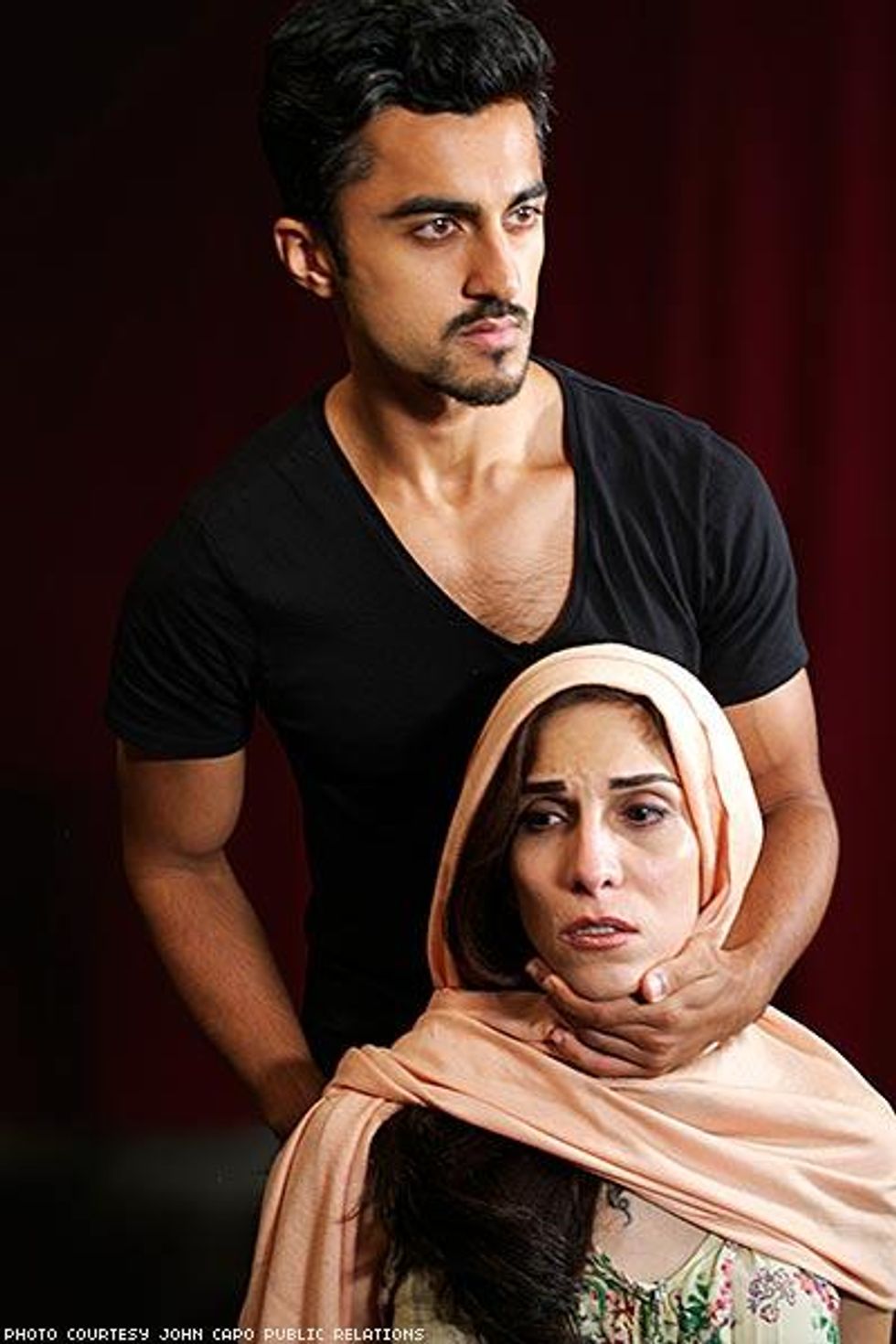
The role of Samantha in Death of the Persian Prince seems tailor-made for Mohseni. Statuesque, with an expressive face and musical voice, Mohseni captures the character's emotional range and allure naturally. The fit is due in large part to the acting acumen Mohseni has spent countless hours developing -- but it's also clearly a matter of shared history.
At left: Gopal Divan and Pooya Mohseni in Death of the Persian Prince
Mohseni tells The Advocate that she can relate in many ways to Samantha's story, though their histories are not the same. Mostly, Mohseni identifies with Samantha's feeling of isolation. She knew that feeling well, she says, while growing up in an Iran where the dominant "trans" narrative -- at least as it's presented in the Western media -- is one in which gay men are forced by the government to transition to "female" in order to "cure" them of homosexuality.
Once a relatively progressive country, Iran became a fundamentalist Islamic state in 1979, the year after Mohseni was born. When Shah Mohammed Reza Pahlavi fell and Ayatollah Khomeini rose to power, homosexuality became punishable by death, with public executions still occurring frequently to this day, as The Advocate has reported. At times, the dead bodies of young men, nooses hanging from their necks, are even placed on trucks and trailed through villages as a warning.
By contrast, being transgender has been legal in Iran ever since Khomeini granted a trans woman the to right to gender-affirming surgery in 1980, after she had pleaded her case and he "took pity," Mohseni explains. The government now has a review board of psychologists and doctors that assesses who may access transition-related health care. But not everyone who transitions is actually trans. In an investigation earlier this year, Vice uncovered that the Iranian government has gone so far as to force some gay, cisgender men to undergo hormone therapy and surgeries that would be considered necessary if they were indeed transgender women. The alternative was death.
Despite the government's apparent preference for gay citizens to transition, Mohseni cautions that in her home country, "[being trans] is legal in only the most technical sense of the word." She explains by saying simply, "It's not accepted. And if people [attack], who are you going to complain to?" The answer, perhaps unsurprisingly, is not "the police."
And as a young trans woman in 1990s Iran, Mohseni says the risk of attack was imminently real for her. She goes on to share a harrowing story of her childhood, sparing few details, even the ones that make her eyes well up with tears. These are tales she's been unable to tell publicly until now, as she was formerly living and working stealth (without disclosing her trans status).
Tracing a line from her childhood innocence of not even realizing she hadn't been labeled "female" at birth to her teenage years, Mohseni weaves a still all-too-common narrative of becoming deeply depressed and feeling lost because her female identity was denied daily. She says she began walking the streets at night, looking for any traces of intimacy from strange men. The brief warmth carried her away, if only for the night.
"Looking back, I obviously had a death wish," she says frankly. "I guess I was trying to find some sort of acceptance, someone who would show me some kind of affection as [the person] I was. Even if that meant someone was using me physically."
Each night went the same: She'd go out on the street looking for a man to embrace her. These men were the kind who would never take her out in the light of day, men who didn't exist in the Iranian imagination, but they were real. Somehow they were always there, prowling, looking to have some fun with a woman like her. They'd know where to find her and they'd call out from their car windows. Oftentimes she'd hop in the passenger seat. Other times, though, something deep down would tell her to turn and walk away quickly.
Finally she learned why her gut had been warning her. "One time," she recalls softly, choking up a bit, "somebody tried to run me over with a car." She pauses. "They had made advances toward me and I declined." It's been nearly two decades since the first time Mohseni feared for her life. But while her voice shakes with the still-present shock of it, she carries little else but a wary understanding and a bit of sadness in her heart toward that mysterious would-be murderer.
"In [an Iranian] world where so many people are sexually frustrated and repressed, everyone is reaching out for some kind of sensuality, no matter whether it's misguided," she explains, carefully reaching for the right words. "Whether it leads to trying to run someone over with a car, I don't begrudge a lot of that. Denying people the most basic of our instincts, the essential need for intimacy -- when people are denied that, it comes out in different ways."
She later recounts another frightening way it emerged. One evening when she was 18, one of her trans friends took her to a park where men covertly gathered, men who were not strictly attracted to cisgender women as they "should be," who had to satisfy their desires in the dark. Out of the blue, the two young women became aware of three large bodies surrounding them. The next second, Mohseni found herself hitting the ground hard as rough hands pushed her down.
"I had never before in my life tried to fight a human being to defend myself, but I did," she describes. "I kicked and screamed and bit. I screamed again." Eyes surrounded the struggling figures, looking out from the shadows, quietly transfixed. Each man's silence as he watched Mohseni being pinned to the dirt seemed to justify the others' nonaction. It was only when someone came running from afar that the three attackers became spooked, Mohseni says; in the space of what felt like seconds, they had vanished back into the gloom.
"I managed to not get violated, but I had nowhere to turn," she concludes. "I couldn't go to the police, I couldn't really tell my dad." So Mohseni simply buried the memory.
IRAN, 1990s: "THAT WAS THE WORLD WE LIVED IN"
As Mohseni talks to The Advocate for an emotional hour, it becomes clear there are other buried memories she doesn't dredge up. Enough of them, she says, so that a "darkness" had seemed to seep into her life slowly after puberty hit, gradually growing over the years. Once a lively child who adored dress-up and pretending to be the "mama" in make-believe games, by age 16 Mohseni was barely speaking. She didn't know why, but she felt no will to open her mouth. She'd lost the urge to eat. Her reality had grown gray and heavy; she spent most hours alone in her mind.
Today, her adult self is able to pinpoint one of the major reasons for that, in words her young self couldn't have: "I had never met a trans person -- never even personally seen a trans person, except as some twisted depiction in a Hollywood movie. ... There was no outside voice: no articles, no television show."
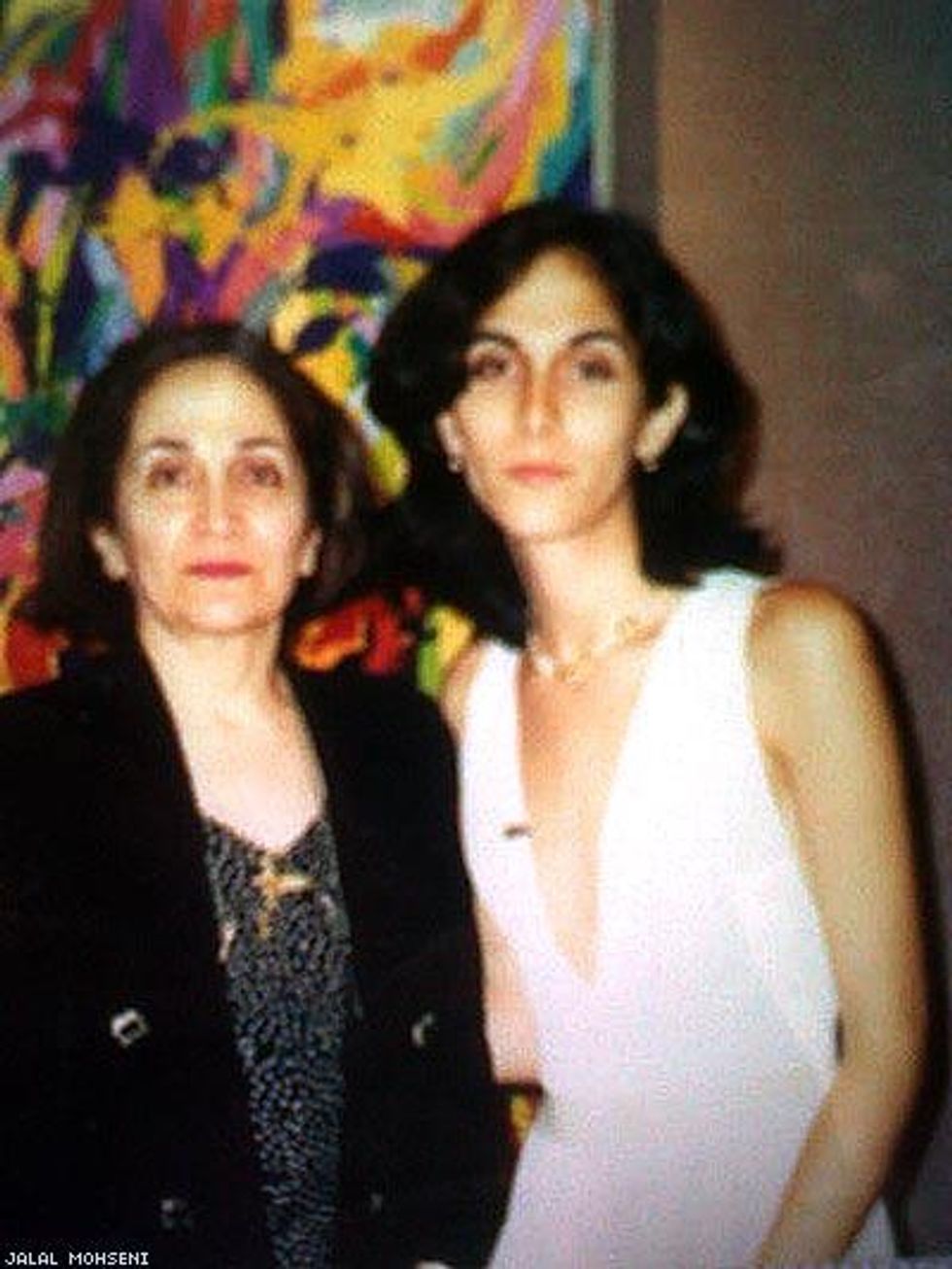
Eventually Mohseni's mother, terrified at her child's persistent lack of speaking or eating, took her to a friend's husband, a psychiatrist. He also happened to be one of the few men in Iran who had seriously studied sexuality and gender. In his quiet office, a trembling 16-year-old Mohseni sat in front of the not unkind-looking doctor, wondering silently about a thought she'd been starting to have with alarming frequency: "I think I might be insane." Meeting with the psychiatrist only seemed to confirm it. But then he opened his mouth.
"You're not crazy," he said. He looked at her placidly. "What you have has a name: gender identity disorder."
"Gender dysphoria," a 37-year-old Mohseni corrects now. The definition changed in the American Psychiatric Association's Diagnostic and Statistical Manual of Mental Disorders in 2012, dropping the stigmatizing shackles of the word "disorder."
No matter the label, however, most important for her younger self was that Mohseni now had a word for what she was feeling -- and she was smart enough to know that she couldn't be alone if the definition existed. Armed with just that information, she'd be able to begin finding information on how to transition, and seek out the company of other trans women like her.
It was never destined to be an easy road, however. When Mohseni first brought her mother the diagnosis, her mother sternly replied, "You can't do anything about [this] until [your father and I] die." Heartbroken, Mohseni says she nonetheless understood that her parents had reason to fear what others would think and how they would treat the entire family once it was known that Mohseni was publicly becoming a woman. She doesn't go into detail, instead letting the air from her previous tales of violence loom. "That was the world we lived in," she adds.
So without her parents' support -- even though, as she says through a few more tears, "I don't think they ever stopped loving me" -- Mohseni slipped into her deepest depression yet at 17. It lasted through those tormented nights she spent walking the streets and getting into men's cars. It lasted through conversion therapy sessions with three different psychologists who, unlike the family friend, thought her transness could be "cured." It lasted through months where her teenage friends abandoned her because their parents worried they might "catch" her "deviancy." And it even lasted after the governmental psychological board officially declared that she was indeed trans (at least, once she threatened to just keep coming back until they said it). Eventually, like a striking number of trans youth to this day, she concluded that life wasn't worth living anymore.
At age 18, in under a single year, Mohseni attempted to kill herself 11 times.
"I must seem like an absolute fool," she laments after telling The Advocate this, seeming almost ashamed that she might not have appeared "serious" enough about her intent since she was never successful. But it becomes clear that Mohseni didn't succeed in her suicide attempts not for lack of trying. Rather, she was simply frightened, and her teenage self hoped the first time that her life would seep out slowly from the razor cut to her wrist, rather than requiring a deep slash. There's no way of knowing what would have happened if her father had not spotted the red stain soaking her shirt sleeve that night and rushed her to an emergency room.
When she next tried the razor and failed to complete her suicide, Mohseni tells The Advocate, she moved on to other methods. Every time she remained alive, she resolved to try again.
Eventually it became clear to her parents: They were going to come home one evening to find their child dead unless they made a drastic change in their lives. Even if they couldn't quite understand it, they would have to figure out how Mohseni could live as the woman she was.
NEW YORK CITY, 2000s: "IT WASN'T A DEBATABLE ISSUE"
Realizing, finally, as a family that Mohseni needed to transition came with one major hitch, however: She couldn't be herself in Iran without fear she'd be in danger. So Mohseni's parents quickly decided that her mother would begin traveling to other countries to learn where the family could settle down, she recalls to The Advocate. Still, questions loomed. What of the arduous immigration process? The loss of community ties? The potential biases against Middle Easterners? How would her father find work?
It seemed that anywhere the Mohsenis went, their experience wouldn't be painless. But one place soon stood out as a real possibility: New York City. With little time to lose, their destination was decided.
That's how at age 19, in 1997, Mohseni found herself packing as much of her belongings as she was able and boarding a plane with her parents, headed halfway around the world. She credits her parents today for saving her life with a move not many caregivers would make.
Once she was in New York, Mohseni began seeing a psychiatrist immediately to gain access to hormone therapy. By January 1998, she held the prescription in her hand: a new year, a new Mohseni. Over the next 12 months she socially transitioned to using female pronouns exclusively. She made more progress toward living openly as a woman, she says, than she had in the two previous decades she'd spent in Iran. But Mohseni adds that there were stumbling blocks; transitioning in the late '90s was an uphill climb anywhere, and in many ways that fact remains scarily unchanged today.
"I didn't have female clothes. I mean, we were immigrants," she explains. "Mom didn't work, I didn't work. It was different from someone who has a lot of privileges that people take for granted. ... We were living on savings, pretty much, for the entire first year." But at least one aspect of the transition was inherently simple: her name. "Pooya," a gender-neutral name given her at birth, has always felt right to her.
Looking back now, Mohseni unhesitatingly declares to The Advocate that immigrating to New York was the crucial turning point in her life that has allowed her to become the healthy, confident massage therapist and actress she is today. The New York she's known hasn't simmered with the same intense volume of violence and repression that the Iran of her childhood had, even if a subtle undercurrent was present in the early days. "The catcalls," she remembers ruefully. "People looking at you when you're standing in line for the bus. You hear the whispers."
In fact, when Mohseni started being perceived as female by strangers all the time, only one final threat lurked for her younger self: the men she dated. She explains that without access to many other kinds of love at that point in her life -- or even other occupations beyond making sure her transition goals were on track -- she assumed that men who didn't fully respect her identity and autonomy were "the best that I could do."
At 25, an intense romance with a man 17 years her senior led to marriage for Mohseni -- and then divorce. When she was finally able to undergo her last gender-affirming surgery that year, their relationship seemed to veer more and more into vicious arguments. Her husband felt, she says, that she'd "owed" it to him to have gotten his opinion first before the procedure, but Mohseni knew she was her own woman. "It wasn't a debatable issue," she says.
Her husband didn't agree. And more and more, Mohseni found their fights about it ending with her pushed against walls. "For the first year, it didn't register that he was doing anything wrong," Mohseni reflects grimly. "Then he tried to choke me to death."
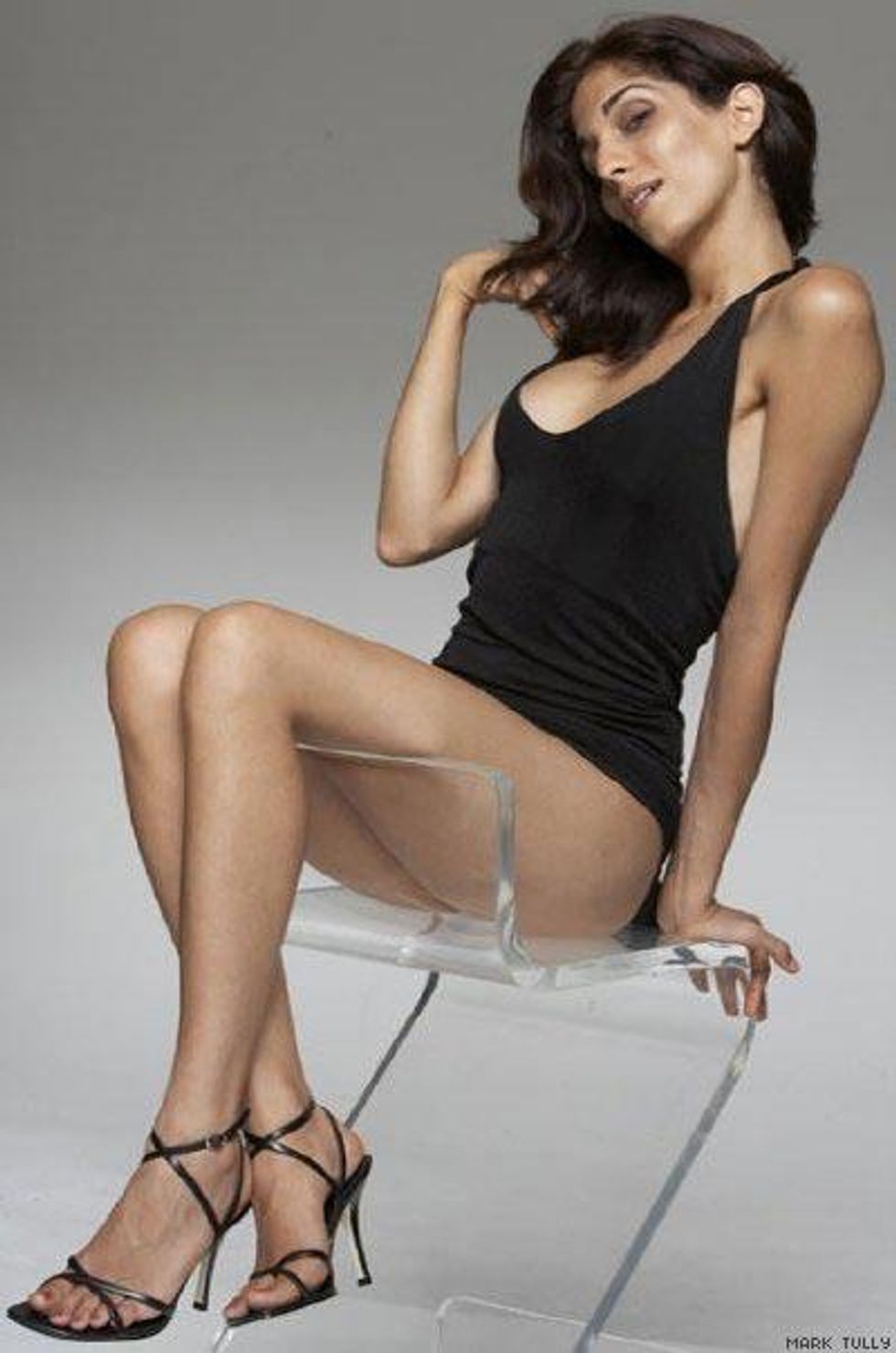
In many ways, Mohseni's story reads like a diary of the worst violence that trans women (and especially women of color) face worldwide at near-epidemic proportions: intimate partner violence, sexual assault, harassment, conversion therapy, murder, and suicide. She knows it, and it keeps her talking about the assaults, now that she feels freer to in a post-marriage equality America.
But while she'll attribute much of the pain she experienced in years past to the climate of Iran during her childhood, she is also sure to credit her homeland with providing her the impetus to become an actress, which is now one of her life's highlights. "Growing up in Iran during the [Iran-Iraq] War, one of the few things that brought us joy was watching movies," she explains.
Though the films she remember fondly all lacked positive -- if any -- depictions of trans characters, Mohseni says they nonetheless allowed her to escape the darker parts of her reality. She dreamed of becoming a singer, but the difficulties of her life led her to drop the goal. Then, five years ago, looking for new inspiration, she began singing lessons and started contemplating pulling together a one-woman show. Acting classes logically followed, and Mohseni quickly fell in love with the craft. She has since appeared in over 30 plays and independent films as well in as a guest spot on CBS's Madam Secretary.
As she continues to audition for roles, Mohseni now looks back on her big trans coming-out moment, so long "in the making," as a potentially huge plus for her career -- a thought that seemed almost incomprehensible only a few years prior.
"I swear, [the trans female roles] have been growing like mushrooms in the last year. Not even the last year -- the last eight months," she tells The Advocate excitedly. "I think after Transparent ... winning those Golden Globes, and Caitlyn Jenner and Laverne Cox, there just seems to be more stories." Though she admits that, "right now, [trans characters are] a little bit fashionable ... we're the new 'virgin territory'" and that the depictions of trans women could stand to become "less Barbie-fied," she can't help but see the lasting positive impact.
After all, perhaps somewhere, right now, there is a young trans girl in much the same circumstances as Mohseni once was, searching for any depiction of her reality to confirm that what she feels is right and sane and beautiful.
"I [came out] for the teenage version of me that suffered unbelievable cruelty at the hands of people that didn't know better," Mohseni reflects. "And, on the other hand, [I came out] to be a role model, an inspiration. It's not that I'm that great of a person, but we all need role models. Young people need role models so they can aspire to something."
So the next time a trans female role comes around, Mohseni says casting directors should be on the lookout. She may very well be the first woman in line. "I'm a trans person," she imagines herself declaring, no longer worried about who else might hear. "You asked for a trans person, and here I am!"

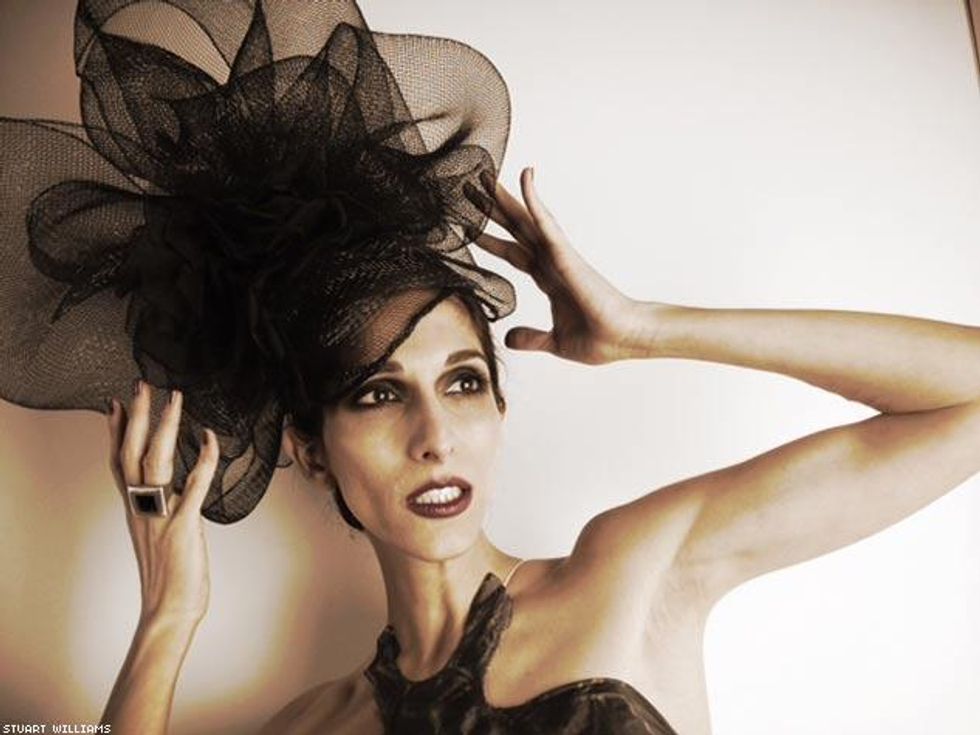








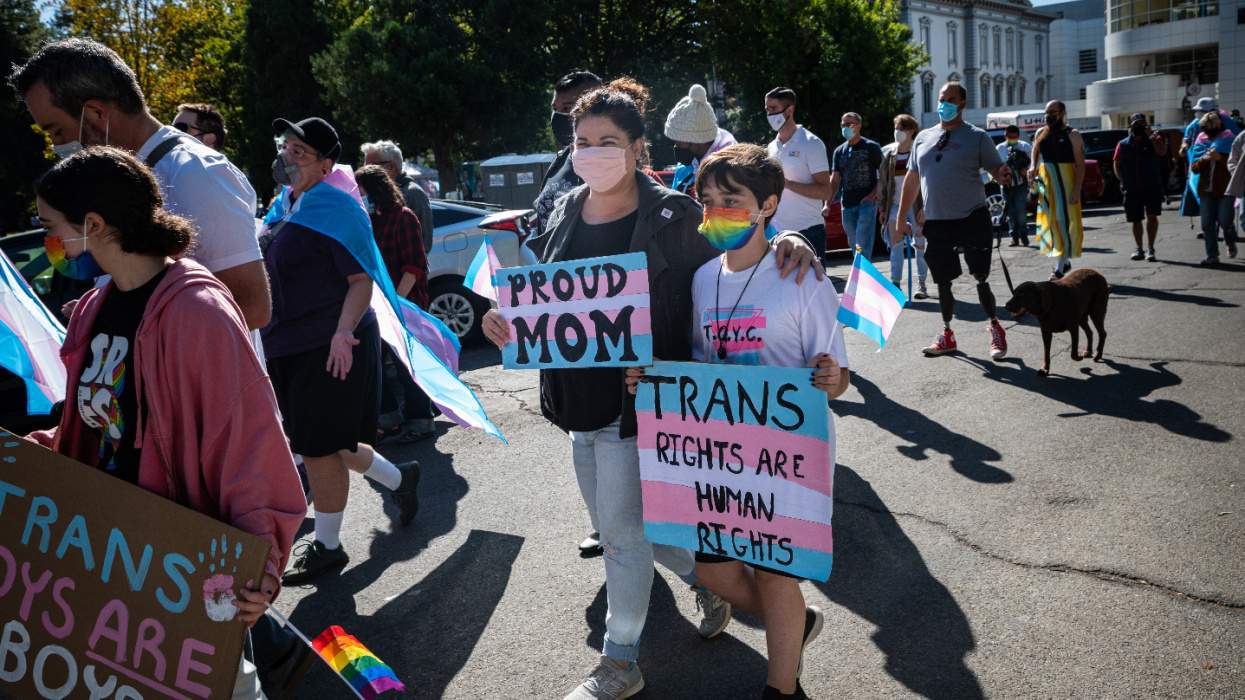





Charlie Kirk DID say stoning gay people was the 'perfect law' — and these other heinous quotes
These are some of his worst comments about LGBTQ+ people made by Charlie Kirk.